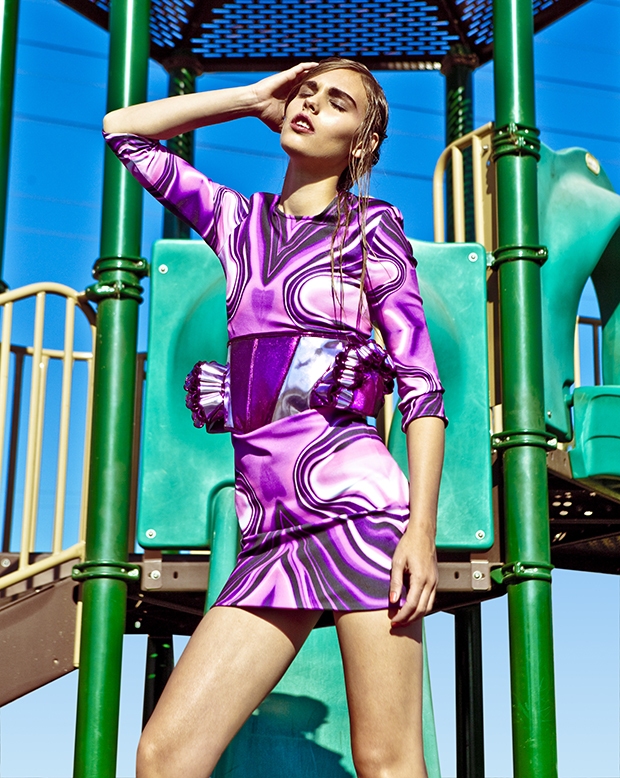
Corsetiere and designer Maya Hansen shares memories of early days before the runway, and the inspiration behind her fantastical creations
By Sarah dE Brun
It’s not simple to uncover the location, decade, or even era from which the corset originated. The earliest documentation may date back as far back as the 7th millennium BC, in the age of early Crete, but the earliest definitive example is depicted in mid-1500s portraits of Eleanora di Toledo, Duchess of Florence. Eleanora used such garments to create a distinctive shape to her torso and constriction to her chest. Such a configuration to her figure could not be created without the help of some kind of harness, and the garment has sported one kind or another ever since.
It’s a suitable coincidence that the story of the corset begins with a Spanish noblewomen, too, as Maya Hansen, born and raised in Madrid, has more or less single-handedly resurrected the iconic undergarment.
Prior to settling into the notoriety of being one hell of a corsetiere, Hansen spent her days, after graduating in 2002 from Centro Superior de Diseno de Mode de Madrid, collecting awards for her early designs—from 2000’s Portuguese International Prize at the Porto Fashion Awards to 2001’s second prize at the Smirnoff Fashion Awards. She presented her first runway collection in 2001 at the Barcelona Gaudí Fashion Show.
It was a trip to Berlin, however, that marked a pivotal evolution. She entered a corsetry store (TO.mTO to be exact), tried on one of the boudoir pieces, and bought it on the spot. At home she deconstructed the garment to uncover the process of how it was sewn, and decided that moment to dedicate her future to learning the language and composition of the feminine undergarment.
And so she did. Hansen spent her days interning at Spanish womenswear designer Javier Larrainzar, nights designing black leather dresses for a gothic store in Madrid called Underworld. Her sales gained momentum and soon her dresses were being carried in stores from Berlin to New York. In 2006, she launched a brand, and produced her first corset—one that entailed metal boning and structuring in an 18th century-inspired pattern.
“I love baroque things,” stated the designer. “This kind of aesthetic really inspires me…from the Renaissance period to Marie Antoinette, to name a few examples.” In fact, Hansen finds inspiration in all things elaborate and unusual. She can detect beauty in the simplest of objects, like a cupcake or bird, and dives deep into historic periods, cultural designs, and traditions to grasp hold of whatever she desires to translate through fabric, shape, and volume.
Since Hansen debuted her brand with the Heavy Metal Couture collection at EGO Madrid Cibeles Fashion Week in February of 2010, little but praise has followed. In September 2010, she took home the L’Oreal Prize for Best Young Designer with the ever-so-sheer, soft and sweet SS11 “Lace Wings” collection. It’s no surprise that Lady Gaga soon took notice, and Spain” collection, which featured leather glove-adorned models, high-collared satin blouses, monarch portraits upon delicate silk, and golden trimmings and lace. The future-meets-femme collection “Knotted” centered around falling fringe, braided bodices, and faux leather separates that made their way down the runway at Cibeles Madrid Fashion Week. Recently, the designer has added a bridal line to the brand, one that speaks to every romantic girl who craves a bit of a gothic influence on her big day.
Along with corsets, Hansen’s form-fitting gowns, tailored pantsuits, and playful headpieces posses a power all their own. Her recent collection for SS14, “Pangea,” takes a break from a more constricted silhouette, although a handful of mind-blowing bodices still work their way in. (The pieces were inspired by a flight she took over the beaches of Miami.)
In the collection, energetic colors connect mirrored patterns on printed dresses and swimwear. Fiery oranges, deep-sea blues, and vibrant greens create a marbled impression covering jumpsuits, bikinis, day dresses, and robes. It is a lively compilation that sets the tone for the positive energy the designer inevitably brings with her into the future. Near-future plans include heading out of Spain to countries like Kuwait, Poland, the UK, Germany, The Netherlands, Brazil, and Japan (the last nation is where 50% of her annual sales are coming from).
“Our audience is actually easy to find,” Hansen added with a grin. “They love exclusive pieces, and these garments fit perfectly with a woman who likes to be a little bit in command, and still feel really feminine.” •

Photography by Mark Oberlin
Styling Styling by Andru
Hair & Makeup Albert Elizondo using Pureology, Sam Villa tools, skin care by Kiehls and Hourglass Cosmetics
Nails Pilar Noire
Model Caroline Kaczor, LA Models
Maya Hansen
mayahansen.com

